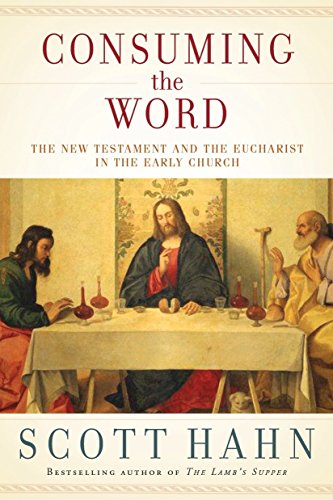Consuming the Word: The New Testament and The Eucharist in the Early Church / Hahn, Scott
| List Price: | |
Our Price: $19.55 | |
|
For Bulk orders
| |
|
Used Book Price: | |
| Consuming the Word: The New Testament and The Eucharist in the Early Church / Hahn, Scott | |
| Publisher: Image | |
| Availability:In Stock. | |
| Sales Rank: 315392 | |
|
Similar Books
Q&A with Scott Hahn
Q. In the book you talk about the importance of reading Scripture as the human writers of the Bible intended for it to be read. Any tips on how to do this?
A. We should receive the Bible the way it was meant to be received. The books of the Bible, both the Old and New Testaments, were written not to be read on a page, but to be proclaimed in the assembly. Through most of history perhaps, most of God’s people could not read. Many were illiterate; some were blind; some had other handicaps. Very few could afford to buy books. But all could encounter Christ as he intended, because the Church proclaimed the inspired Word whenever the Holy Mass was celebrated..
The Mass presents the whole of the biblical story over the course of a three-year cycle of lectionary readings. Just by showing up on Sunday, Catholics will encounter readings from most of the books of the Bible. If you go to daily Mass, you’ll hear most of the Bible proclaimed many times through your life. You’ll also have it illuminated by preaching and by the other prayers of the Mass.
It’s good to take up serious Bible study in addition to our liturgical encounter with the Lord. And for that we have many advantages over our ancestors in the faith. Not only can most of us read, we can even own a copy of the entire Bible. For the first millennium of Christianity, only the very rich could own the Scriptures. If we’re feeling a holy ambition, we can take online classes to learn the fine points of Greek and Hebrew, and we can read the Scriptures in their original languages. The early Christians could only dream of such opportunities. We have them — but few people take advantage as they should. It’s good to be serious about Bible study. But still: the Mass is where it rightly begins. The Church is the “pillar and bulwark of truth” (1 Timothy 3:15), and the Mass is the way the Church has always shared out the truth.
Q. You write that the Bible and the liturgy were made for each other and that consuming the Word of God makes us hunger for the words of God. What do you mean by this?
A. Read the documents, visit the churches, and look at the art of earliest Christianity. Everywhere you’ll see expressions of a people deeply Eucharistic and deeply biblical. I’ll say it again: They did not have the ability to study the Scriptures as you and I do; but they hungered for the Word, and they received the Word. Take a tour of the Roman catacombs, and what do you see? You see the familiar Bible stories: Noah, Jonah, Daniel in the Lion’s den, Moses striking the rock. What else do you see? Everywhere you see images of people gathered together at an altar for the breaking of the bread. What did the Church look like in third-century Rome? Just like the Church in Acts 2:42. It was a Church consuming the Word — whether in Jerusalem or Rome, Antioch or Egypt, it always looked the same. True love seeks union. The Word-made-flesh is God’s love seeking us out. That’s the message of the New Testament. God is seeking communion with us — and his means are not merely verbal, not simply spiritual. The Word was made flesh so that they could be Eucharistic.
Q. Why is reading Scripture through the lens of the early Church necessary for evangelizing in a modern world?
A. We are a rootless people, transient as never before, mobile in our work and only intermittently in touch with our families. And yet we have the same old desire our ancestors had: to know where we came from and where we’re going, who made us and why. Many religions propose answers to those questions. Christianity and Judaism differ from other religions because their answers take a verifiable historical form. They’re not mythological. They’re the true story of God’s dealings with a particular people living in a specific land at an identifiable time. The Scriptures have all the grittiness of real-world life. Philosophers constantly tell us that one of the qualities that sets modern people apart from their ancestors is “historical consciousness.” That’s a debatable point. But if it’s true, then Christian history lends our testimony a palpable authenticity. It scratches a modern itch. It feeds a real perennial hunger.
Q. How does your book tie-in with the message and goals of the New Evangelization?
A. Pope John Paul II asked Catholics to “base the New Evangelization on the Eucharist.” There is only one Christ, and we proclaim him as the Eucharistic Lord. This was the proclamation of the early Church. For several generations there was no book that could be called the “New Testament.” That phrase was used to describe the Mass.
Listen, evangelization is always an impossible task. Do you think the Apostles really stood a chance as they set out to convert the Greco-Roman world? All the might of Rome was arrayed against their project. They had to overcome the weight of pagan tradition, and the long-established habits of a cruel and pornographic culture.
Yet they converted the world. How was that possible? They did it with the power of the New Testament, which is the grace of the Mass — which is the grace of salvation! The Mass reminds us that evangelization is a gift before it’s a task. It’s receiving before it’s doing. And we can’t share what we don’t first possess.
Now you can buy Books online in USA,UK, India and more than 100 countries.
*Terms and Conditions apply
Disclaimer: All product data on this page belongs to
 .
.No guarantees are made as to accuracy of prices and information.










